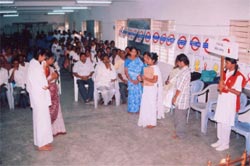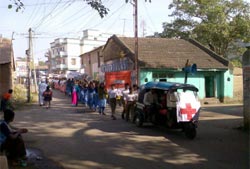 |
HIV/AIDS programme of the Indian Red Cross Society (IRCS) gets highest rating for its overall performance in the mid-term evaluation report of the Red Cross Red Crescent Societies Regional HIV and AIDS programme in South Asia. The report has been filed after an evaluation visit by a three member team of Dr. Ram Neupane, External Consultant, Ms. Cecilia Anshelm, Swedish Red Cross and Mr. Bhanu Pratap, IFRC, SARD.
According to the report the National Societies namely Afghanistan, Bangladesh, Pakistan and Sri Lanka have been placed under B and C grades wherein India and Nepal fall under grade ‘A’. |
The key achievements noted by the evaluators for IRCS are development of HIV and AIDS strategic plan, broader interventions and enhanced response profile- both quantitatively and qualitatively, enhanced level of partnership for resource provision-financial and technical, expansion of NS network and membership, have trained and engaged large number of students in the schools and colleges to disseminate HIV prevention messages to their schoolmates, have established a collaborative linkage with the PLHIV and their networks and it has found a niche between youth peer education programme (YPEP) and voluntary non-remunerative blood donation( VNRBD).
Alongwith the strengths, the report also discusses the weaknesses, opportunities and threats to the IRCS HIV/AIDS Programme. Two prominent weaknesses mentioned are non-availability of baseline survey and lack of fund raising strategy. The opportunities given are to focus on community reach and exploration of non-traditional means of funding. The threats mentioned are high staff turnover at the State and District level.
After going through the report Prof. (Dr) S.P. Agarwal, Secretary General, IRCS stated that “In two years time the HIV and AIDS programme of IRCS has come a long way. It has consistently been working on the mission to make an impact upon lives of the people living with HIV/AIDS (PLHIV). This achievement has been possible due to the dedication of 77 staff members across the five programme States and trained health team at the National Headquarters”. “Also the continuous support from the International Federation and Consortium members has helped in the evolvement of the programme” , he added.
He further mentioned that for any programme there are opportunities and challenges but to have a win-win situation it is important to maintain the balance between the two and to absorb the resources judiciously. |
 |
|